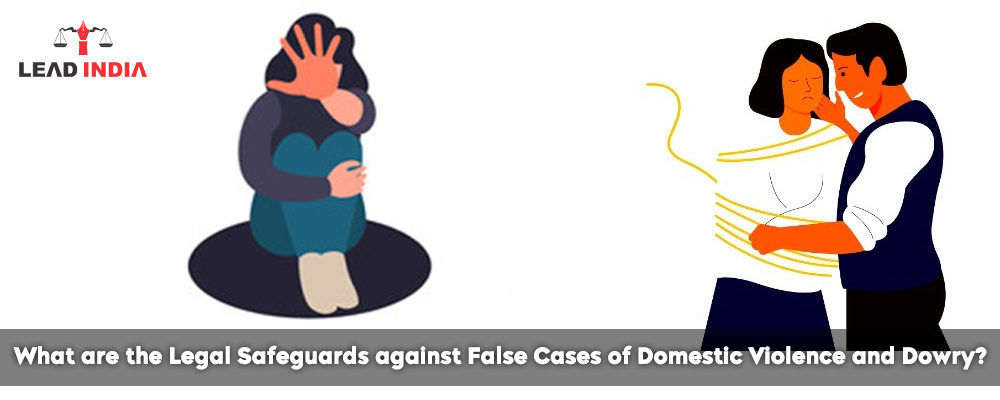Indian legislation about dowries and domestic violence has played an essential role in protecting the honour and rights of women in India. However, such laws can be easily misused as well resulting in malicious prosecution tarnishing of images and disruption of lives. Most importantly, the Indian legal system has measures in place to prevent the misuse of the law from protecting individuals, while at the same time ensuring justice for genuine victims.
Domestic Violence and Dowry Cases: Legalities
- Protection of Women from Domestic Violence Act: This is done to protect women from any form of violence within their homes, be it verbal abuse, physical abuse emotional and sexual abuse and even financial abuse which falls under domestic violence. It provides various forms of relief such as help and assistance, orders of residence and orders of protection. Forcefully, the law enables women to take steps for their lawful protection from violence and does not subject them to tortuous criminal processes.
- Bhartiya Nyaya Sanhita: Section 85 deals with the theory of an abusive husband and/or his in-laws. It covers emotional and physical abuse, especially for demands of dowries. Since the offence is cognizable, non-bailable and non-compoundable, the accuse can be arrest without any warrant and also cannot be withdrawn once the trial has commence.
- Dowry Prohibition Act: The purpose of the Dowry Prohibition Act is to remediate dowry-associated violence as the act prohibits ‘giving’ or ‘taking’ dowry in any form. Offenders of this law are sentence to imprisonment or fined for soliciting, offering or taking dowry and even looking for financial assurance. Besides the aforementioned provisions, BNS also prohibits harassment related to dowry and killing of women for dowry as per sections 80 and 85 respectively.
Need A Legal Advice
The internet is not a lawyer and neither are you. Talk to a real lawyer about your legal issue

Legal Safeguards against False Cases of Domestic Violence and Dowry
Apart from judicial measures, the Indian legislature has also proposed changes and reforms aimed at combating misuses of dowry laws and domestic violence. Among them are the following actions:
- Amendment to Section 85 BNS: The section 85 was revise through Criminal Law (Amendment) Act, 2018 added a clause that allow anticipatory bail under conditions where the accused substantiated the falsehood of the allegations. This amendment also pursues the aim of settlement of marital disputes without recrimination and brings attention to mediation as a mode of alternative dispute resolution.
- Dowry Prohibition Act Reforms: For its effectiveness and to prevent its misuse the Indian government has periodically reviewed the Dowry Prohibition Act. Proposals have been make to the effect that dowry harassment should be make a compoundable offence with the leave of court so that the parties can resolve the dispute amicably.
- Introduction of Family Welfare Committees: For the purposes of assessing the validity of complaints lodged within the context of Section 85 of BNS, the idea of Family Welfare Committees was conceptualize. Eventually, the Supreme court changed the rules governing these committees but the first use of these committees clearly illustrated the need for a system that should eliminate false cases before instituting any legal suit.
Procedural Safeguards against False Cases of Domestic Violence and Dowry
- Necessity of Supporting Evidence: The Courts have emphasized the need for justification and supporting documents in cases of dowry abuse and domestic violence. The defendant cannot be convict purely on the basis of charges make without evidence. This prevents the risk of false claims make against individuals as well as ensuring that only genuine cases of abuse are dealt with.
- Role of Mediation and Counselling: Sometimes the courts also recommend mediation and counselling so as to resolve issues especially when there are no claims of serious physical injuries. Mediation reduces the risk of such frivolous claims being make and encourages the two parties to come to a compromise by allowing both parties to express their grievances and settle the dispute.
- Examining the Reasons for Complaints: Judges, especially in cases that relate to marriage problems, often consider the reasons for the allegations. If it is ascertain that the parties have made allegations with ulterior motives in order to retard or hasten the processes of divorce or for the purpose of getting some financial compensations, the court may dismiss the case altogether, punish the parties or even both.
Penal Consequences for False Accusations
- Section 248 of the Bhartiya Nyaya Sanhita: The Act deals with such false charges by mentioning in Section 248 of BNS that one can be imprison or fined or both for making those virulent charges for a period extending two years. The maximum punishment in this case is five years and fine of rupees two lakhs.
- Section 215 of the Bhartiya Nagarik Suraksha Sanhita: Section 215 of the Bhartiya Nagarik Suraksha Sanhita also prescribes the use of false evidence in judicial proceedings and creates the offence of perjury upon a witness making specific false claims. This clause aims at checkmating the vice of deceitful involved in testimony and upholding order in the justice system.
One can talk to a lawyer from Lead India for any kind of legal support. In India, free legal advice online can be obtain at Lead India. Along with receiving free legal advice online, one can also ask questions to the experts online free through Lead India.





 Talk to a Lawyer
Talk to a Lawyer